California lowers incentives for rooftop solar panels
California Implements Changes to Rooftop Solar Market to Enhance Energy Equity and Reduce Fossil Fuel Dependency
In a significant move aimed at achieving a more balanced distribution of energy costs and reducing reliance on fossil fuels during evening hours, California utility regulators have approved substantial modifications to the state’s thriving rooftop solar market.
Watch the video
California lowers incentives for rooftop solar panels
California has long been at the forefront of residential solar panel adoption, with over 1.5 million homes in the state currently equipped with solar panels. Through a long-standing program, homeowners with solar panels have enjoyed generous payments from power companies for sharing excess solar energy, resulting in minimal electric bills for some solar-powered households.
However, this setup has faced criticism for not adequately accounting for homeowners’ fair share of the overall energy grid costs. While solar-powered homes benefit from reduced reliance on the grid during daylight hours, they still rely on traditional electricity in the evening when solar power generation diminishes. The grid costs encompass various expenses, including electric transmission and wildfire prevention work, and state regulators allocate a specific amount that utilities can collect from their customer base.
To address these concerns, the California Public Utilities Commission has approved changes designed to lessen the financial incentives for selling excess power back to utilities. Furthermore, the new regulations aim to encourage homeowners to integrate home storage systems alongside their solar panels, enabling them to tap into stored power during nighttime hours instead of solely relying on the conventional energy grid. Although solar power contributes significantly to California’s energy supply during the day, fossil fuels dominate the energy mix during evenings and nights.
Commissioner John Reynolds emphasized the need to assign greater value to power exports during periods of higher fossil fuel usage to ensure the long-term sustainability of the rooftop solar industry. He stated, “In short, we are making this change because of our commitment to addressing climate change.”
These adjustments come in response to three hours of public comment, during which the commission faced sustained criticism from some speakers who accused them of impeding the state’s climate efforts. By implementing these changes, California seeks to strike a balance between promoting renewable energy adoption and fostering a fair and sustainable energy ecosystem that supports the state’s climate goals.
California Reduces Incentives for Rooftop Solar Panels, Sparking Controversy
The recent decision to modify the state’s rooftop solar program, led by the California Legislature, has ignited a contentious debate involving major utilities, the solar industry, and various environmental groups.
These changes will specifically affect customers of the state’s three main utilities – Pacific Gas & Electric, Southern California Edison, and San Diego Gas & Electric – and will be implemented gradually, allowing for a transition period. Existing rooftop solar users will not be affected; the modifications will solely apply to new customers.
This discussion occurs in the context of California’s ambitious goals to transition away from fossil fuels. State air regulators are set to vote on a climate roadmap that emphasizes quadrupling solar and wind power to achieve carbon neutrality by 2045.
A coalition called Affordable Clean Energy for All, supported by utilities, argues that the cost burden of $4 billion is being shifted from solar to non-solar customers. However, the solar industry disputes this figure, asserting that it fails to consider the broader benefits of rooftop solar, such as enhancing grid resilience and reducing the necessity for costly traditional power infrastructure.
Estimates from the industry indicate that approximately 16% to 20% of the 150,000 households installing solar panels annually in California also incorporate battery storage systems.
Solar companies express concerns that the overall reduction in incentives will discourage more people from adopting home solar solutions.
Sean Gallagher, Vice President of State and Regulatory Affairs for the Solar Energy Industries Association, stated, “The solar and storage industry remains concerned that the transition from net metering to the new net billing structure is too abrupt and threatens to slow the deployment of rooftop solar in California.”
The Public Advocates Office, a consumer advocacy group affiliated with the utilities commission, considers the proposal a “step in the right direction.” They cite commission estimates indicating that residential solar customers will still save an estimated $100 on their monthly bills with the modified program, and up to $136 per month if they also install storage systems.






